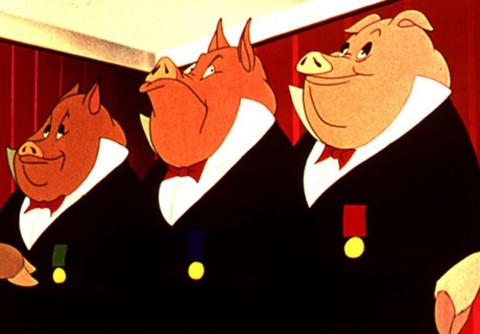
By Twana A. Xeyat:
George Orwell wrote a wonderful novel called ‘Animal Farm’ in 1945. His thoughts were ignited when he happened to see a village boy whipping a cart-horse. At that moment, Orwell received the inspiration he needed to formulate his ideas into ‘Animal Farm’. He later wrote: “It struck me that if only such animals became aware of their strength we would have no power over them, and that men exploit animals” — just as the government in a totalitarian state exploits the common people.
The novel presents the subtle ways in which a group of citizens — of a farm or a nation — can be eventually led by the nose into a terrible life ruled by a totalitarian regime, Of course, the novel’s meaning is not rooted solely in its portrayal of the Russian Revolution. The novel asks its readers to examine the ways in which political leaders with seemingly noble and altruistic motives can betray the very ideals in which they ostensibly believe, as well as the ways in which certain members of a nation can elect themselves to positions of great power and abuse their fellow citizens, all under the guise of assisting them.
After that brief description of the novel let review our society and history in Kurdistan–Iraq as we have lived and grown up in it. I remember in 1983 when my parents narrated stories about the Kurdish nation’s burden under the totalitarian regime of Iraq, and especially under the Saddam Hussein dictatorship, when no one had the simple right of free expression nor political and national rights as Kurds in Iraq.
During that year more suppression and war happened in Iraq, From one side the Iraqi regime was fighting against the Kurdish revolutionary movement in Iraqi Kurdistan and from the other side there was the Iraq- Iran war which didn’t end until 1988. The pressure on the Kurdish people reached maximum levels and one is reminded of this sentence in Orwell’s novel: “Mr. Jones, of the Manor Farm, had locked the hen-houses for the night, but was too drunk to remember to shut the pop- holes”. Of course Saddam Hussein had ‘locked’ all the houses and all the village and towns and cities of the Kurdistan region, but he was too drunk on power to realise that all the Kurdish people were going to join the revolution and participate in a major uprising to topple the Iraqi regime in the Kurdish cities of Iraq (Sulaimany, Erbil, Kirkuk and Duhok).
The 1991 uprisings were a series of popular rebellions in northern and southern Iraq in March and April 1991 after the Gulf War. The mostly uncoordinated insurgency, often referred to as the Sha’aban Intifada among Arabs and as the National Uprising among Kurds, was fuelled by the perception that the Iraqi President Saddam Hussein was responsible for systemic social repression and had become vulnerable to regime change. This perception of weakness was largely the result of the outcome of two prior wars: the Iran–Iraq War and the invasion of Kuwait, both of which occurred within a single decade and devastated the economy and population of Iraq.
In our region (Iraqi Kurdistan), fighting continued until October when an agreement was made for Iraqi withdrawal from Kurdish cities. This led to the establishment of the Kurdistan Regional Government and creation of a Kurdish Autonomous Republic in three provinces of northern Iraq. Tens of thousands of Iraqi soldiers dug-in along the front, backed by tanks and heavy artillery, while the Iraqi government established a blockade of food, fuel, and other goods to the area. The U.S. Air Force continued to enforce a no-fly zone over northern Iraq, and the U.S. military built and maintained several refugee camps in 1991.
Kurds further expanded their area of control after participating in the U.S.-led 2003 invasion of Iraq, which led to the recognition of Kurdish autonomy by the new Iraqi government. But unfortunately, after 25 year of Kurdish autonomy, the people of Kurdistan are suffering from many obstacles and crises due to bad governance, lack of transparency, and no commitment by our leaders to establish requisite infrastructure in the region.
Orwell’s novel describes the Animal Farm commandments. “All animals are equal” applies at the first stage of the uprising on the farm but later, after the farm leaders got involved in business and forgot their fellow animals they changed this to, “All animals are equal but some are more equal than others”. Unfortunately at the beginning of the uprising in the Kurdistan region we also heard a lot of slogans like, “All people of Kurdistan are equal”, but that slogan has become useless in practice after the involvement of our leaders in business and the monopolization of Kurdistan’s business without any transparency.
Twana Ahmed Xeyat is a civil engineer, based on Sulaimani, with 15 years’ experience in the fields of management and construction. He also writes articles, translates English articles into Kurdish and worked with several foreign journalists covering the 2003 war.
.jpg)



